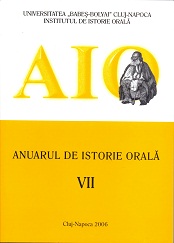„NE DESCURCAM” DESPRE PENURIA ECONOMICĂ ŞI STRATEGIILE DE SUPRAVIEŢUIRE DIN ROMÂNIA ANILOR ’80 ŞI FORMELE ACTUALE DE REMEMORARE
„WE MANAGE OURSELVES” ON THE ECONOMIC HARDSHIP AND SURVIVAL STRATEGIES FROM THE ’80s ROMANIA AND CURRSENT MODES OF REMEMBERING
Author(s): Valeska BoppSubject(s): History
Published by: Argonaut
Summary/Abstract: This paper is based on the master thesis of the author „Ne descurcam…” Mangel- und Überlebensstrategien in Rumänien in den 1980er Jahren“, handed in at the University of Leipzig, Institute for Cultural Studies in 2003. The thesis as a whole focuses on the economic shortages in the 1980ies in Ceauşescu’s Romania, which are described in the first part with the help of Western newspaper articles and archive material from RFE. There is also taken a glance at the official discourse in Romania, reflected in Scînteia, where prosperity is proclaimed, and only between the lines can be found some hints of existing problems. As all this material still gives no information on how the “real” situation was like and if it was as “alarming” as described for example in the Western press, I started asking people in Bucharest about this period and the project became in its second part an oral history project - which results are presented here. I was talking to 15 people of different age, most of them from an intellectual milieu, but also a saleslady and one woman being actively involved in black-market-activities. All persons questioned lived in the 1980ies in Bucharest, a condition for being questioned, because circumstances varied a lot between the countryside and the capital. The interview material permitted not only an insight into necessary day-to- day practices of the city-dwellers, but also showed, how people structured and interpreted the last period of Romanian Communism, starting in their memories with the earthquake in 1977 and interpreting it as “beginning of the end”, mentioning secondly the program for “rational alimentation” and the anger about it, as there was nearly nothing available, as glimmer of hope for a better socialism the visit of Gorbaciov in 1987, and finally the year 1989, when Ceauşescu despite the announcement that Romania was free of its debts, did not change his attitude towards consumers needs. After presenting this, how I call it, “subjective chronology” - as there was no strict connection to my question about economic shortages in the 1980ies which I expected to begin with the first rationing orders in 1980 - I am describing in a detailed manner the ways of obtaining the necessary goods. And one, even if the most unloved way, was queuing, hence a phenomenon deserving a more detailed look. While people were forced to spend a lot of their time in lines before magazine doors, they yet managed to organize it “well” in the sense, that the kept places for each other, lent each other children to obtain more etc. – and represent themselves so as active social actors. Another way to obtain necessary goods were certain socio-economic positions: While the position of the saleslady was one of the most profitable, also civil servants had to be satisfied in order not to report bad fulfilling the states plans. Academics were forced to exchange their “intellectual capital” for food, which could become a payment for private lessons...
Journal: Anuarul Institutului de Istorie Orală
- Issue Year: 2006
- Issue No: VII
- Page Range: 399-425
- Page Count: 27
- Language: Romanian

